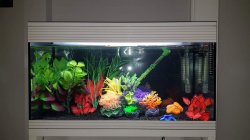Wow, thank you so much for working that out for me. My maths is shocking though so its great that you did that ha. Im reallllly new to the hobby but I intend to try my damnest to get it right & I will definitely look into floating plants. I'm in contact with a really good Betta breeder here in the UK & she is going to help source a very calm male for me so that there is less chance of any issues. Ill also be adding any other fish before the Betta so as to reduce the risk of him being territorial. I'm literally a less than a full day into my cycle having added my ammonia just today, so when the time comes, I may have changed my mind on the fish I will eventually keep. I just want to make sure I do my best to get everything right, hence why I came here. So I really do appreciate you guys taking the time to help me out
I am going to take the time to explain something as you seem willing to learn (not all new hobbyists are, sadly). And this has to do with the comments about the Betta.
First, we must always recognize that we need to provide what the fish "expect" rather than what we may want, in terms of the aquascape and species. Freshwater fish have evolved over thousands of years to be "at their best" in a specific environment. "Environment" here means not only the water parameters, but the aquascape (décor), water flow, numbers in the group for a shoaling species, and other species. If we want our fish to be truly healthy, we must understand these needs for the species and be prepared to provide them; if not, we are in the wrong hobby, because we are not going to change what is programmed into the fish's DNA just because it doesn't suit our intention.
Having said that, there is sometimes a degree of "adaptability," but if it is present at all (in many species it most assuredly is not), it is limited and pushing the boundaries will not lead to success. So we are wisest to assume the fish will be "normal," and not an exception to the norm. Individual fish can vary from the norm, due to various factors, but here again it is safest for the fish (and our sanity) not to try to force the fish into what is an artificial situation from what it "expects." Read the blue and green citations in my signature; this is what both sources are thinking about.
So, while some may have (or assume they have) a "peaceful" community Betta, it is not normal, and in fact it may not be so "peaceful" as they think. Down the road the Betta (or the tankmates) may decide they have had enough of this frustration, and do something about it--which usually means aggression, but sometimes can be the opposite and the fish literally wastes away. Frustration is not fair to the fish, any more than it is fair to subject a dog or a cat, or a person for that matter, to such a situation. And it is two-sided; the Betta may not appreciate the tankmates in his territory, but at the same time or alternatively the tankmates may find the Betta an easy target for bullying or fin nipping. And even if no physical signs are apparent, the fish are still sending out chemical signals called pheromones (read by others of that species) and allomones (read by other species), and this can be equally stressful for the fish. Unless you can somehow get inside the individual fish's mind, there is no way to "source a peaceful" fish when the species is deliberately bred to fight.
If you want a Betta, fine; the cories
should be OK, but this is not guaranteed. Absolutely no upper fish should be considered. Assuming you want what is best for the fish. Cories like to play, and I have often seen them do this with upper fish too; nothing would annoy a Betta more than being hounded by playful fish.
Sorry, forgot to ask - in your opinion, what fish would you suggest then for my water parameters?
Only provided there is no Betta, you have quite a range of options. The tank is 96 liters (25 gallons)...what are the dimensions? Length and width are generally much more important for fish than volume, because of the territorial nature of many fish (even mildly so) and the level of activity in swimming; an active species needs more length than a sedate species. As for the parameters, most fish from South America and SE Asia are suited to soft water. Some are small, some larger; some fairly sedate, others rambunctious.






